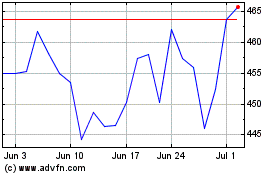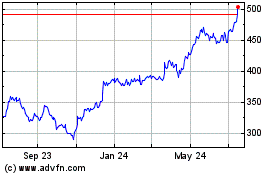By Richard Rubin and Mike Vilensky
New York state lawmakers found a clever way for employers to
help their workers circumvent a new $10,000 federal cap on state
and local tax deductions. Employers, however, so far aren't crazy
about it.
The idea, which became law last month, creates a new optional
payroll tax that shifts the state and local tax deduction from
individuals who can no longer fully take it to businesses that can.
Employers are worried about compliance costs, interactions with
union contracts, complexity across state lines and the difficulty
of explaining to workers how a plan that might lead to smaller pay
raises still puts more money in their pockets.
"It's a creative approach by the governor's office, and I give
them credit for thinking through issues," said Peter Faber, a tax
lawyer at McDermott Will & Emery LLP in New York who advises
large corporations. "As my clients consider the practical realities
of implementing the scheme, they are concerned."
The Wall Street Journal asked the 10 largest private employers
in the state and in New York City, along with all Fortune 100
companies based in New York state, whether they would opt for the
new payroll tax. None that responded said they would do so, though
they have until Dec. 1 to make a decision for 2019.
The state and New York City are still determining whether to use
the new payroll tax for their own employees.
That caution is an indication that some of the most imaginative
ways of working around the new tax law's restrictions may be tricky
to implement on a large scale.
The new payroll tax is part of the state's response to last
year's federal tax law, which capped at $10,000 the amount of state
and local tax payments that individuals could deduct from income on
their federal tax forms.
In part because of that new cap, 8.3% of New York households
will get a federal tax increase in 2018 averaging $3,340, compared
with 6.3% nationally, according to the Tax Policy Center, a
Washington group led by an Obama administration official.
Gov. Andrew Cuomo and state lawmakers r esponded with the new
state payroll tax, which employers who choose to participate will
pay on behalf of their workers. The state will count these payments
toward state income taxes owed by the workers.
The advantage: Employers can deduct these payments for federal
tax purposes, which individuals are now limited in doing.
But there's a catch. Employers would likely recover the cost of
paying the state taxes on behalf of employees by holding down their
salaries.
The net effect of the tax changes would be less pretax income
for workers, but lower federal taxes and more after-tax income.
The optional payroll tax starts at 1.5% of wages above $40,000
in 2019 and rises to 5% by 2021, below the state's top individual
income-tax rate. The phase-in is designed to give employers and
workers time to adapt without sudden cuts in wages. At the 5% rate,
a single employee making about $100,000 would save more than $700,
said Daniel Hemel, a University of Chicago law professor who helped
develop and promote the payroll tax idea. Today, that employee pays
at least $2,850 in New York state taxes. The employee would be
better off if his employer pays the $2,850 state tax and his
federal income and payroll taxes are based on a $97,000 salary.
The Internal Revenue Service could challenge the novel approach,
though many legal experts believe it complies with federal law.
Even if the IRS doesn't challenge it, many businesses are
wary.
"How do you articulate that somebody in New York is getting a
smaller raise than someone in Florida who is doing the same job?"
said David Pope, a tax lawyer at the law firm Baker McKenzie. "It
becomes very complex very quickly."
Pretax income, what people think of as their salary, is
important. It determines future Social Security benefits and can
affect 401(k) matching contributions, employees' share of
health-care premiums and the starting point for job
negotiations.
"There is interest in mitigating the impacts of the federal tax
law, so employers are looking at how they might take advantage of
these new provisions," said Kathryn Wylde, director of the
Partnership for New York City, a business association. "At the same
time, there are concerns about how the Treasury and IRS will look
at them and what happens if you have employees in other
states."
Large New York employers, including Goldman Sachs Group Inc.,
JPMorgan Chase & Co., Citigroup Inc., Verizon Communications
Inc. and Wegmans Food Markets Inc., declined to comment. Time
Warner Inc. said it hasn't made a decision. American Airlines Inc.,
which has 8,000 New York employees, is analyzing the law and
"assessing the appropriate course of action," spokeswoman Sarah
Jantz said in an email.
Smaller businesses full of tax-savvy, high-income professionals
might be more likely to participate, because they're less likely to
encounter the same challenges with employee communications and
parity with employees in other states. Employers' choices over the
next few years will determine whether the new state law benefits
just the best-off New Yorkers or a larger group.
"It's going to take time for people to understand it and get
comfortable with it," said Robert Mujica, Mr. Cuomo's budget
director. He added that the state will soon put out guidance for
employers and talk to neighboring states about starting reciprocal
programs.
(END) Dow Jones Newswires
May 02, 2018 05:44 ET (09:44 GMT)
Copyright (c) 2018 Dow Jones & Company, Inc.
Goldman Sachs (NYSE:GS)
Historical Stock Chart
From Mar 2024 to Apr 2024

Goldman Sachs (NYSE:GS)
Historical Stock Chart
From Apr 2023 to Apr 2024
